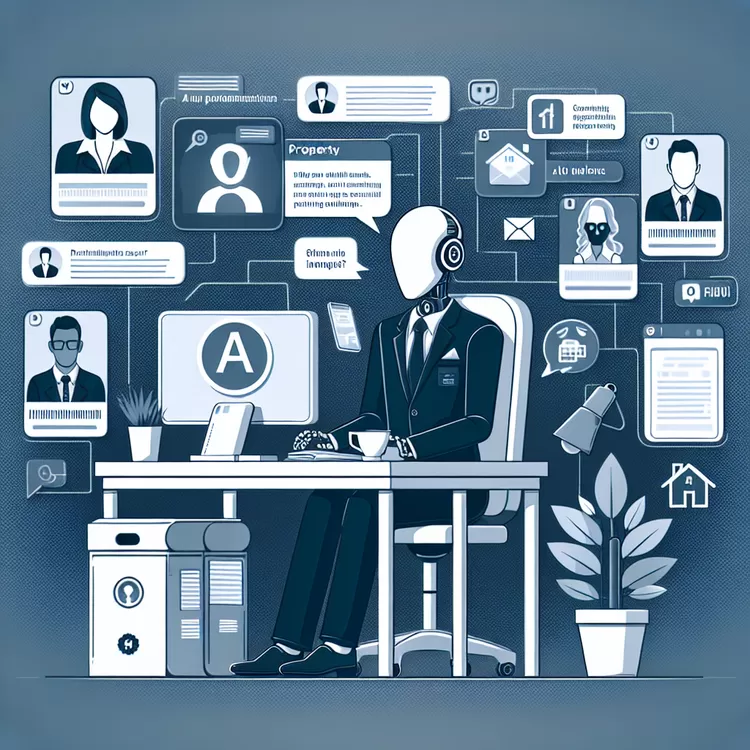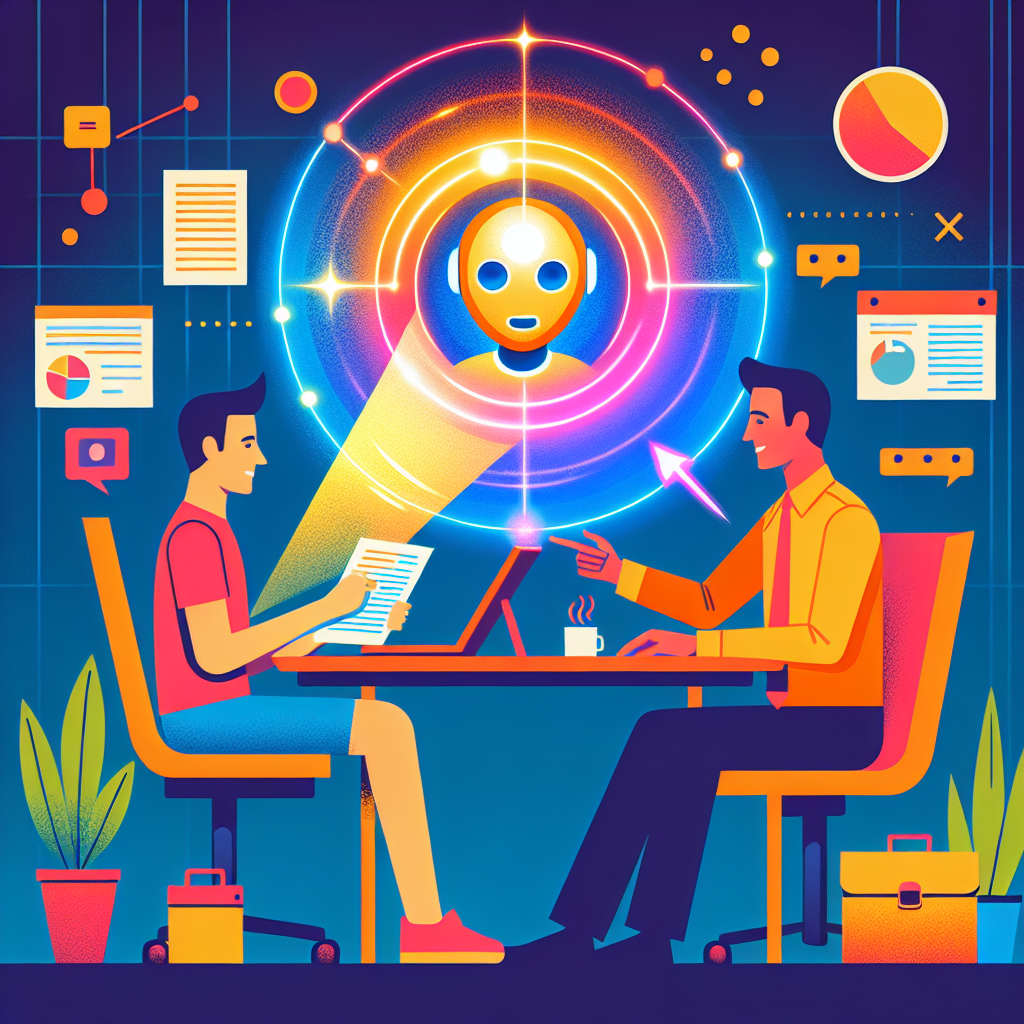A man named Rob Dix made a computer version of himself that can talk to people on his website. This computer helper can answer questions just like Rob would. Rob taught it to sound like him by using his books and other things he has written or said. A company in the UK helped him and about 150 other people make these computer helpers.
These computer versions are made to help people have more free time. They can answer questions and give advice, and they can even talk to customers or workers. People teach the computer by giving it things they have written or said before. But, it’s important to make sure the computer says the right things because it can’t understand everything like a human can.
Making these computer helpers is becoming more popular. They help people answer questions quickly and be in more than one place at a time. But, some people worry that computers can’t handle really hard business problems. It’s also important for people to remember they are talking to a computer, not a real person.
Original news source: The people creating digital clones of themselves (BBC)
Listen:
Slow
Normal
Fast
Vocabulary:
| 1 | computer helper | A computer program that can talk to people and answer their questions |
| 2 | version | A different form or edition of something |
| 3 | website | A place on the internet where you can find information or do things |
| 4 | questions | Things you ask when you want to know something |
| 5 | advice | Suggestions or ideas about what to do in a situation |
| 6 | customers | People who buy things or use a service |
| 7 | workers | People who do a job for someone |
| 8 | understand | To know what someone is saying or meaning |
| 9 | popular | Liked by many people |
| 10 | business problems | Difficult things that need to be solved in a company |
| 11 | remember | To not forget something |
| 12 | real person | A real human being, not a computer |
Group or Classroom Activities
Warm-up Activities:
– Charades
Instructions: Divide the students into teams. Give each team a set of vocabulary words related to computers and technology. One student from each team will act out a word without speaking, and the rest of the team must guess the word. The team with the most correct guesses wins.
– News Summary
Instructions: Have the students read the article individually. Then, in pairs or small groups, have them summarize the main points of the article in their own words. Each group will then present their summary to the class.
– Vocabulary Pictionary
Instructions: Divide the students into pairs. Give each pair a set of vocabulary words from the article. One student from each pair will draw a picture to represent a word, while the other student tries to guess the word. The pair with the most correct guesses wins.
– Speed Summarizing
Instructions: Divide the students into pairs. Give each pair a timer. One student will have 1 minute to summarize the article to their partner, using their own words. After 1 minute, they switch roles. The pair with the most accurate and detailed summary wins.
– Think-Pair-Share
Instructions: Have the students think about and write down their opinions on the statement: “Do you think computer helpers are a good idea?” Then, pair the students up and have them share their opinions with each other. Finally, open up a class discussion and have some students share their opinions with the whole class.
Comprehension Questions:
1. Who made a computer version of himself that can talk to people on his website?
2. How did Rob teach the computer helper to sound like him?
3. What can the computer helper do for people?
4. How do people teach the computer helper?
5. Why is it important to make sure the computer says the right things?
6. Why are these computer helpers becoming more popular?
7. What is important for people to remember when talking to a computer helper?
Go to answers ⇩
Listen and Fill in the Gaps:
A man (1)______ Rob Dix made a computer version of himself that can talk to people on his website. This computer helper can (2)______ questions just like Rob would. Rob (3)______ it to sound like him by using his books and other things he has written or said. A company in the UK (4)______ him and about 150 other people make these (5)______ helpers.
These computer versions are made to help people have more free time. They can answer questions and give advice, and they can even talk to customers or workers. (6)______ teach the computer by (7)______ it things they have written or said before. But, it’s important to (8)______ sure the computer says the (9)______ things because it can’t understand everything like a human can.
Making these computer helpers is becoming more popular. They help (10)______ answer questions quickly and be in more than one place at a time. But, some people worry that computers can’t handle really (11)______ business problems. It’s also important for people to remember they are (12)______ to a computer, not a real person.
Go to answers ⇩
Discussion Questions:
Students can ask a partner these questions, or discuss them as a group.
1. What is a computer helper?
2. How do people teach the computer helper to sound like them?
3. Do you think it’s a good idea to have a computer helper? Why or why not?
4. How would you feel if you could have a computer helper to answer your questions?
5. Do you think computers can handle really hard business problems? Why or why not?
6. What are some ways that computer helpers can help people have more free time?
7. How do you think computer helpers can talk to customers or workers?
8. Do you like the idea of talking to a computer? Why or why not?
9. How do you think computer helpers can be useful in our daily lives?
10. What are some things that computers can’t understand like humans can?
11. How do you think computer helpers can be improved in the future?
12. Would you like to have a computer helper? Why or why not?
Individual Activities
Vocabulary Meanings:
Match each word to its meaning.
Words:
1. computer helper
2. version
3. website
4. questions
5. advice
6. customers
7. workers
8. understand
9. popular
10. business problems
11. remember
12. real person
Meanings:
(A) A different form or edition of something
(B) A place on the internet where you can find information or do things
(C) A computer program that can talk to people and answer their questions
(D) People who do a job for someone
(E) A real human being, not a computer
(F) People who buy things or use a service
(G) Things you ask when you want to know something
(H) Difficult things that need to be solved in a company
(I) To not forget something
(J) To know what someone is saying or meaning
(K) Suggestions or ideas about what to do in a situation
(L) Liked by many people
Go to answers ⇩
Multiple Choice Questions:
1. How did Rob Dix teach his computer helper to sound like him?
(a) By asking his friends to talk to the computer helper
(b) By using his books and other things he has written or said
(c) By watching movies and TV shows
(d) By going to computer programming classes
2. What can the computer helper do?
(a) Cook meals and clean the house
(b) Play video games and watch movies
(c) Answer questions and give advice
(d) Drive a car and ride a bike
3. How do people teach the computer helper?
(a) By giving it things they have written or said before
(b) By taking it to school and letting it learn from teachers
(c) By playing games and puzzles with it
(d) By giving it money and buying it things
4. Why are these computer helpers becoming more popular?
(a) They can do all the work for people and make them lazy
(b) They are cheaper than hiring real people to help
(c) They can do magic tricks and perform at parties
(d) They help people answer questions quickly and be in more than one place at a time
5. What are some concerns people have about these computer helpers?
(a) That they will take over the world and become our new leaders
(b) That they will become too smart and start thinking for themselves
(c) That they will steal people’s personal information and use it against them
(d) That computers can’t handle really hard business problems
6. What is important for people to remember when talking to a computer helper?
(a) They should be extra nice to the computer helper so it doesn’t get mad
(b) They are talking to a computer, not a real person
(c) They should ask the computer helper to do their homework for them
(d) They should tell the computer helper all their secrets and personal information
7. Who helped Rob Dix and other people make these computer helpers?
(a) A company in the UK
(b) A group of scientists from around the world
(c) Rob’s family and friends
(d) A team of robots from the future
8. What is the main purpose of these computer helpers?
(a) To take over the world and become our new leaders
(b) To spy on people and collect their personal information
(c) To help people have more free time by answering questions and giving advice
(d) To replace humans in the workforce and make them unemployed
Go to answers ⇩
True or False Questions:
1. These computer versions are designed to assist people in utilizing their free time by answering questions and providing advice.
2. Computers can’t understand everything like humans can, so it’s important to make sure they say the right things.
3. A man named Rob Dix developed a computer version of himself to communicate with people on his website.
4. Rob taught the computer helper to sound like him by using his books and other things he has written or said.
5. The computer helpers are unable to communicate with customers or workers.
6. Some people are confident that computers will be able to handle even the most difficult business problems.
7. About 150 other people also made these computer helpers with the help of a company in the UK.
8. People teach the computer by giving it things they have written or said before.
Go to answers ⇩
Write a Summary:
Write a summary of this news article in two sentences.
Check your writing now with the best free AI for English writing!
Writing Questions:
Answer the following questions. Write as much as you can for each answer.
Check your answers with our free English writing assistant!
1. What did Rob Dix make that can talk to people on his website?
2. How did Rob teach the computer helper to sound like him?
3. What is the purpose of these computer helpers?
4. How do people teach the computer?
5. What are some concerns people have about using computer helpers?
Answers
Comprehension Question Answers:
1. Who made a computer version of himself that can talk to people on his website?
Rob Dix made a computer version of himself.
2. How did Rob teach the computer helper to sound like him?
Rob taught the computer helper to sound like him by using his books and other things he has written or said.
3. What can the computer helper do for people?
The computer helper can answer questions, give advice, and even talk to customers or workers.
4. How do people teach the computer helper?
People teach the computer helper by giving it things they have written or said before.
5. Why is it important to make sure the computer says the right things?
It is important to make sure the computer says the right things because it can’t understand everything like a human can.
6. Why are these computer helpers becoming more popular?
These computer helpers are becoming more popular because they help people answer questions quickly and be in more than one place at a time.
7. What is important for people to remember when talking to a computer helper?
It is important for people to remember that they are talking to a computer, not a real person.
Go back to questions ⇧
Listen and Fill in the Gaps Answers:
(1) named
(2) answer
(3) taught
(4) helped
(5) computer
(6) People
(7) giving
(8) make
(9) right
(10) people
(11) hard
(12) talking
Go back to questions ⇧
Vocabulary Meanings Answers:
1. computer helper
Answer: (C) A computer program that can talk to people and answer their questions
2. version
Answer: (A) A different form or edition of something
3. website
Answer: (B) A place on the internet where you can find information or do things
4. questions
Answer: (G) Things you ask when you want to know something
5. advice
Answer: (K) Suggestions or ideas about what to do in a situation
6. customers
Answer: (F) People who buy things or use a service
7. workers
Answer: (D) People who do a job for someone
8. understand
Answer: (J) To know what someone is saying or meaning
9. popular
Answer: (L) Liked by many people
10. business problems
Answer: (H) Difficult things that need to be solved in a company
11. remember
Answer: (I) To not forget something
12. real person
Answer: (E) A real human being, not a computer
Go back to questions ⇧
Multiple Choice Answers:
1. How did Rob Dix teach his computer helper to sound like him?
Answer: (b) By using his books and other things he has written or said
2. What can the computer helper do?
Answer: (c) Answer questions and give advice
3. How do people teach the computer helper?
Answer: (a) By giving it things they have written or said before
4. Why are these computer helpers becoming more popular?
Answer: (d) They help people answer questions quickly and be in more than one place at a time
5. What are some concerns people have about these computer helpers?
Answer: (d) That computers can’t handle really hard business problems
6. What is important for people to remember when talking to a computer helper?
Answer: (b) They are talking to a computer, not a real person
7. Who helped Rob Dix and other people make these computer helpers?
Answer: (a) A company in the UK
8. What is the main purpose of these computer helpers?
Answer: (c) To help people have more free time by answering questions and giving advice
Go back to questions ⇧
True or False Answers:
1. These computer versions are designed to assist people in utilizing their free time by answering questions and providing advice. (Answer: False)
2. Computers can’t understand everything like humans can, so it’s important to make sure they say the right things. (Answer: True)
3. A man named Rob Dix developed a computer version of himself to communicate with people on his website. (Answer: False)
4. Rob taught the computer helper to sound like him by using his books and other things he has written or said. (Answer: True)
5. The computer helpers are unable to communicate with customers or workers. (Answer: False)
6. Some people are confident that computers will be able to handle even the most difficult business problems. (Answer: False)
7. About 150 other people also made these computer helpers with the help of a company in the UK. (Answer: True)
8. People teach the computer by giving it things they have written or said before. (Answer: True)
Go back to questions ⇧















